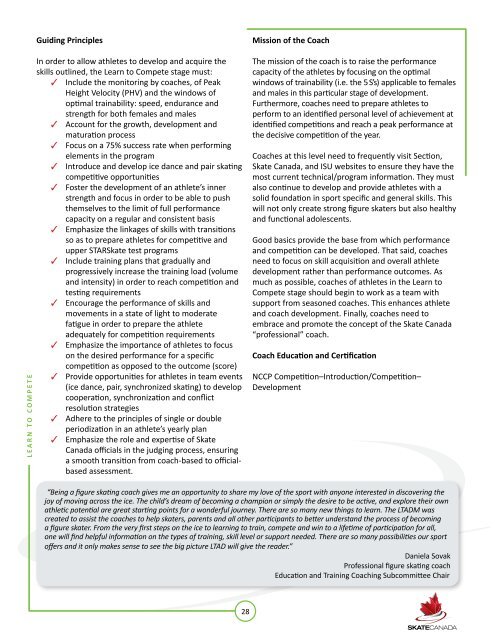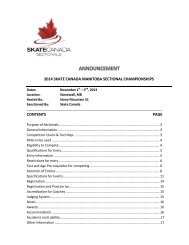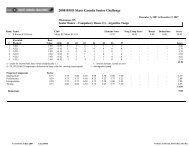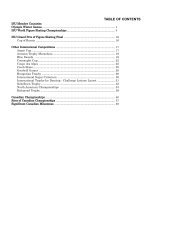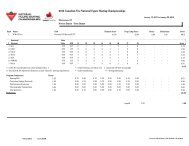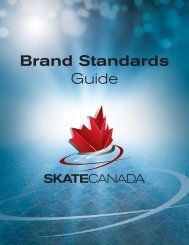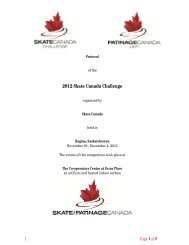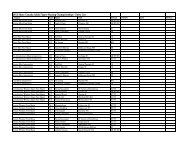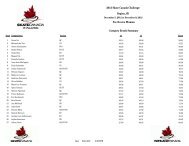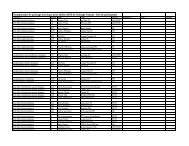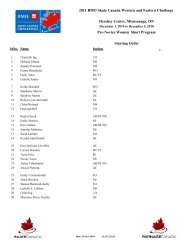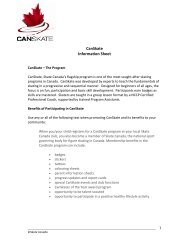LONG-TERM ATHLETE DEVELOPMENT - Skate Canada
LONG-TERM ATHLETE DEVELOPMENT - Skate Canada
LONG-TERM ATHLETE DEVELOPMENT - Skate Canada
Create successful ePaper yourself
Turn your PDF publications into a flip-book with our unique Google optimized e-Paper software.
L E A R N T O C O M P E T E<br />
Guiding Principles<br />
In order to allow athletes to develop and acquire the<br />
skills outlined, the Learn to Compete stage must:<br />
3 Include the monitoring by coaches, of Peak<br />
Height Velocity (PHV) and the windows of<br />
optimal trainability: speed, endurance and<br />
strength for both females and males<br />
3 Account for the growth, development and<br />
maturation process<br />
3 Focus on a 75% success rate when performing<br />
elements in the program<br />
3 Introduce and develop ice dance and pair skating<br />
competitive opportunities<br />
3 Foster the development of an athlete’s inner<br />
strength and focus in order to be able to push<br />
themselves to the limit of full performance<br />
capacity on a regular and consistent basis<br />
3 Emphasize the linkages of skills with transitions<br />
so as to prepare athletes for competitive and<br />
upper STAR<strong>Skate</strong> test programs<br />
3 Include training plans that gradually and<br />
progressively increase the training load (volume<br />
and intensity) in order to reach competition and<br />
testing requirements<br />
3 Encourage the performance of skills and<br />
movements in a state of light to moderate<br />
fatigue in order to prepare the athlete<br />
adequately for competition requirements<br />
3 Emphasize the importance of athletes to focus<br />
on the desired performance for a specific<br />
competition as opposed to the outcome (score)<br />
3 Provide opportunities for athletes in team events<br />
(ice dance, pair, synchronized skating) to develop<br />
cooperation, synchronization and conflict<br />
resolution strategies<br />
3 Adhere to the principles of single or double<br />
periodization in an athlete’s yearly plan<br />
3 Emphasize the role and expertise of <strong>Skate</strong><br />
<strong>Canada</strong> officials in the judging process, ensuring<br />
a smooth transition from coach-based to officialbased<br />
assessment.<br />
Phone 613.747.1007 I Toll Free 1.888.747.2372 I Fax 613.748.5718 I Toll Free Fax 1.877.211.2372<br />
28<br />
Mission of the Coach<br />
The mission of the coach 865 Sheord is to raise Road, the Ottawa, performance<br />
Ontario K1J 1H9<br />
capacity of the athletes by focusing on the optimal<br />
windows of trainability (i.e. the 5 S’s) applicable to females<br />
and males in this particular stage of development.<br />
Furthermore, coaches need to prepare athletes to<br />
perform to an identified personal level of achievement at<br />
identified competitions and reach a peak performance at<br />
the decisive competition of the year.<br />
Coaches at this level need to frequently visit Section,<br />
<strong>Skate</strong> <strong>Canada</strong>, and ISU websites to ensure they have the<br />
most current technical/program information. They must<br />
also continue to develop and provide athletes with a<br />
solid foundation in sport specific and general skills. This<br />
will not only create strong figure skaters but also healthy<br />
and functional adolescents.<br />
Good basics provide the base from which performance<br />
and competition can be developed. That said, coaches<br />
need to focus on skill acquisition and overall athlete<br />
development rather than performance outcomes. As<br />
much as possible, coaches of athletes in the Learn to<br />
Compete stage should begin to work as a team with<br />
support from seasoned coaches. This enhances athlete<br />
and coach development. Finally, coaches need to<br />
embrace and promote the concept of the <strong>Skate</strong> <strong>Canada</strong><br />
“professional” coach.<br />
Coach Education and Certification<br />
NCCP Competition–Introduction/Competition–<br />
Development<br />
“Being a figure skating coach gives me an opportunity to share my love of the sport with anyone interested in discovering the<br />
joy of moving across the ice. The child’s dream of becoming a champion or simply the desire to be active, and explore their own<br />
athletic potential are great starting points for a wonderful journey. There are so many new things to learn. The LTADM was<br />
created to assist the coaches to help skaters, parents and all other participants to better understand the process of becoming<br />
a figure skater. From the very first steps on the ice to learning to train, compete and win to a lifetime of participation for all,<br />
one will find helpful information on the types of training, skill level or support needed. There are so many possibilities our sport<br />
offers and it only makes sense to see the big picture LTAD will give the reader.”<br />
Daniela Sovak<br />
Professional figure skating coach<br />
Education and Training Coaching Subcommittee Chair


